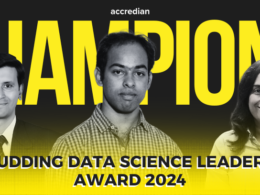In Accredian Spotlight Series today, we shine a light on Roshni Yadav, who is a member of Accredian’s PGP-DSAI June 2021 Batch and currently works at Amazon as a Business Associate.
Her journey in the field of Data Science and Artificial Intelligence is an inspiration to many aspiring data scientists, and her story showcases the effectiveness of Accredian’s PGP-DSAI program in helping students achieve their career goals.
Q1: Which program & batch are you part of at Accredian & tell us more about your current work profile?
Roshni: I am a part of Accredian’s PGP-DSAI June 2021 Batch and currently working at Amazon as a Business Associate. My primary responsibility is to assist Amazon business users with any issues they may encounter while using Amazon’s business services.
Additionally, I work as a freelance Data Analyst for Pamas Technologies, a tech firm that I joined in April 2022.
Q2: Walk us through your career journey & what got you interested in Data Science & Machine Learning.
Roshni: I obtained a B.E. in Computer Engineering in June 2019 and shortly after joined Amazon as a Customer Service Associate. In December of that year, I was promoted to Amazon Business Associate. During the pandemic, I had the chance to work as an Interim Data Analyst for four months.
Following this experience, I returned to my role as an Amazon Business Associate, but my passion for data and eagerness to expand my knowledge in the field motivated me to enroll in Accredian and begin my journey towards becoming a data scientist.
Q3: What all tools and packages in Data Science & Machine Learning have you mastered in your Data Science & AI program at Accredian so far?
Roshni: I am grateful for the comprehensive education that I received at Accredian, which enabled me to refine my skills and gain practical experience through various projects and assignments. My expertise extends beyond Python and its crucial libraries, such as Jupyter Notebook, Scikit-learn, and TensorFlow, to include R Studio, Tableau, MS-Excel, Power BI, and SQL.
These tools have not only helped me understand the complexities of data analysis but also enabled me to proficiently and present data in a compelling manner. I am confident that my skill set and experience will enable me to make significant contributions to any organization I collaborate with.
Q4: What are some of initial challenges when you got started on your Data Science journey and how did you overcome it?
Roshni: After embarking on my journey to learn data science, I encountered several challenges, including a lack of foundational knowledge in statistics, probability, and linear algebra, which are essential for data science. To address this, I dedicated time to studying these subjects and practicing with relevant problems.
Additionally, cleaning and preprocessing data can be a challenging and time-consuming task, especially when dealing with large datasets. I recognized the significance of data cleaning and preprocessing and developed effective strategies for efficiently handling these tasks.
Another challenge I faced was selecting the appropriate model for a given problem and evaluating its performance. To overcome this, I familiarized myself with different machine learning algorithms and learned how to choose and evaluate models based on the specific problem and data available.
Q5: What is the goal of Data Science?
Roshni: The goal of data science is to extract insights and knowledge from data and use this information to inform decision-making and drive business value. Data science combines several disciplines, including statistics, mathematics, computer science, and domain knowledge, to turn raw data into actionable insights.
The goal of data science is to help organizations make better decisions by providing them with a deeper understanding of their data and the underlying trends and patterns.
Q6: In your view, how has Data Science evolved in the last few years?
Roshni: Data science has evolved rapidly in recent years due to advancements in technology, access to large and diverse data sets, and the growing demand for data-driven decision-making.
Some of the key trends include the increased use of AI and machine learning, the growth of big data, the expansion of cloud computing, the emergence of new data sources, and a focus on interpretability and ethics. Data science will continue to evolve, and it is important for data scientists to stay updated and enhance their skills.
Q7: What are the current trends in Data Science that you are most excited about?
Roshni: Some of the current trends in data science that I am most excited about include:
- Increased use of Artificial Intelligence and Machine Learning: The integration of AI and machine learning into data science has opened up new opportunities for automating and enhancing data-driven tasks.
- Big Data and Cloud Computing: The growth of big data and the expansion of cloud computing have made it easier for organizations to manage, store, and process large amounts of data, enabling more efficient and effective data analysis.
- Interdisciplinary Collaboration: Data science is becoming increasingly interdisciplinary, with data scientists working with stakeholders across different departments and industries to extract insights from data and drive business value.
- Focus on Ethics and Interpretability: As data science becomes more widespread, there is a growing concern about the ethical implications of data-driven decisions and the interpretability of models. This has led to a greater focus on responsible and transparent use of data and data-driven decision making.
These trends are driving innovation and enabling data scientists to extract more value from data and make better decisions.
Q8: Which are some of the blogs that you follow?
Roshni: The blogs I follow for Data science are Towards Data Science, DataCamp, and Fast.ai.
Q9: What is your advice to anyone wanting to start a career in Data Science?
Roshni: To start a career in Data Science, you need to:
- Build a strong foundation in mathematics and statistics.
- Learn programming languages such as Python and R.
- Work with real data through projects, online courses, or competitions.
- Expand your skill set to cover various data science aspects.
- Network with others and stay updated on the latest developments.
- Continuously learn and grow your skills through reading, attending events, and taking online courses.
- Be consistent in your efforts to improve your knowledge and skills.
We hope you enjoyed reading this interview. Check out the Accredian Spotlight for more interesting student stories like this.





